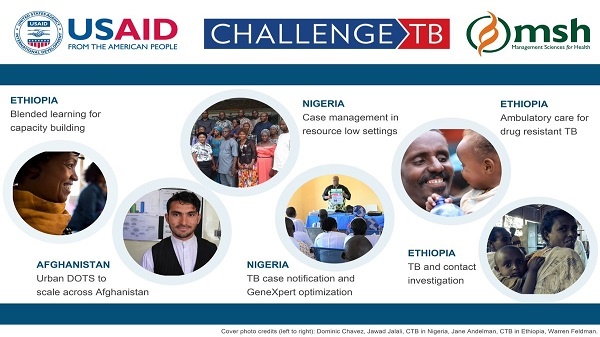
ADDIS ABABA (U.S. Embassy) – The United States marked the completion of its five-year Challenge TB project that contributed to improvements in Ethiopia’s ability to detect, diagnose, and treat tuberculosis (TB) more effectively and save lives across all nine regions of the country. Under this program, the U.S. Agency for International Development (USAID) invested $42 million to improve the quality of TB care and prevention services, enabling patients to receive better access to treatment and medication to fight the infection. As a result, TB deaths have dropped significantly as treatment success rates for TB patients rose to over 90 percent, with 75 percent of those suffering from deadly multi-drug-resistant TB now able to beat the disease after completing their medication regimens.
USAID’s Challenge TB project has been supporting Ethiopia’s Health Sector Transformation Plan and working closely with the Ministry of Health and regional health bureaus in all areas of the country to strengthen the national TB program. The project specifically focused on improving the capacity of health workers to detect TB, provide more accurate diagnoses, and prescribe medications in a timely fashion to help patients begin immediate treatment and increase their chances of survival.
USAID’s Challenge TB project was implemented by KNCV Tuberculosis Foundation, along with Management Sciences for Health and the World Health Organization (WHO), in partnership with the Ministry of Health. The United States is the largest bilateral provider of support to Ethiopia’s health sector, with approximately $150 million per year in funding for tuberculosis; HIV/AIDS; malaria; maternal, neonatal and child health; nutrition; and water, sanitation and hygiene. Overall, the United States has provided approximately $4 billion in development and humanitarian assistance to Ethiopia over the past five years.
About Challenge TB project
Challenge TB is the flagship global mechanism for implementing USAID’s TB strategy as well as contributing to TB/HIV activities under the U.S. President’s Emergency Plan for AIDS Relief (PEPFAR). USAID Bureau for Global Health is building and expanding upon previous successful TB control programs which began in 2000. Challenge TB collaborates with other national and international initiatives in providing global leadership and support for national TB control efforts.
About Challenge TB project in Ethiopia
USAID support in Ethiopia started in 2008 with TB CAP after which support under TB CARE I followed (2010-2014) and subsequently Challenge TB (2015-2019). The Challenge TB project had been designed in alignment with the Ethiopia TB NSP (2013/14-2020) and the post 2015 global end TB strategy with a focus on three major areas of support:
- Comprehensive regional level support and technical assistance.
- National level technical assistance.
- Support for Urban TB activities.
In its first year implementation strategy, Challenge TB Ethiopia focused on Improving quality of TB services (both in terms of access and service utilization as well as patient-centered care), increasing case finding (both in terms of targeted active case finding (ACF) and diagnostic capacity) and enhanced sustainability and strengthening health systems at all levels.
Challenge TB Ethiopia has been working in two rural agrarian regions (SNNPR and Tigray) and three urban districts (Addis Ababa, Dire Dawa, Harari). Strengthening community TB care services (Challenge TBC) in Ethiopia’s decentralized health system using new and innovative strategies was key part of the project. Ethiopia’s three key populations (rural, pastoralist and urban) were targeted working towards improving service utilization in terms strengthening referral linkages at all levels, ensuring available technologies like GeneXpert were optimally used at all levels with special attention to ensure MDR-TB cases benefit optimally both in terms of case finding as well as linkage of services optimizing patient centered care.
Sources: U.S. Embassy in Ethiopia & ChallengeTB.org
